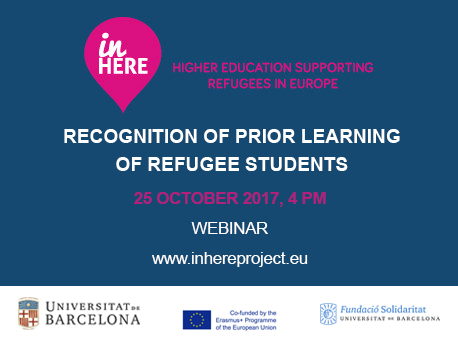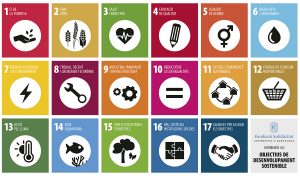The event will take place on Wednesday, October 25, at 4 p.m. (CET). NOKUT, the University of Bari and the Council of Europe will share their experience in the field.

«Recognition of prior learning: obstacles, strategies and ideas to promote the access to higher education for refugee students» is the title for the second webinar organized by the University of Barcelona within the inHERE project (Higher Education Supporting Refugees in Europe). It will take place on Wednesday, October 25, at 4 p.m. (CET).
The aim of the seminar is to share the experience of three institutions that are working on the recognition of prior learning of refugee students and to discuss about the different situations and strategies that Higher Education Institutions (HEI) are facing throughout the recognition process.
The speakers of the seminar will be:
- Marina Malgina, head of section for the recognition of refugees’ qualification in the Norwegian Agency for Quality Assurance in Education (NOKUT),
- Amelia Manuti, responsible for the certification of skills at the Center for life-long learning (CAP) of the University of Bari (Italy),
- Samir Heco, project assistant at the Council of Europe.
The seminar, which will be given in English, is aimed at members of university communities (teaching staff or PDI, administration and service staff or PAS, and students) who carry out or want to carry out any project or activity in order to ease the access to HEI for the refugees, as well as their social integration. The event is also opened to those in the university community who are interested in these initiatives.
Registrations can be submitted in this link.
Inquiries: cjerez@ub.edu
inHERE project
The main aim of the inHERE project is to create opportunities for the refugees to take part in the European Higher Education Area. In order to do so, inHERE strengthens knowledge exchange, peer-support and academic partnership to ease the access and integration to HEI for the refugees.
Webinars are framed within the second part of this project, the Living Lab, which is led by the University of Barcelona. Their purpose is to share, exchange, assess and create joint initiatives, projects and activities for the university community to promote the integration of the refugee students in HEI.
The inHERE project is co-funded by the European Union (through Erasmus+ Programme) and coordinated by the Mediterranean Universities Union (UNIMED). Apart from the University of Barcelona and UNIMED, other members of the project are the European Universities Association (EUA), La Sapienza University of Rome and Campus France. The United Nations High Commissioner for Refugees (UNHCR) is an associate member.







